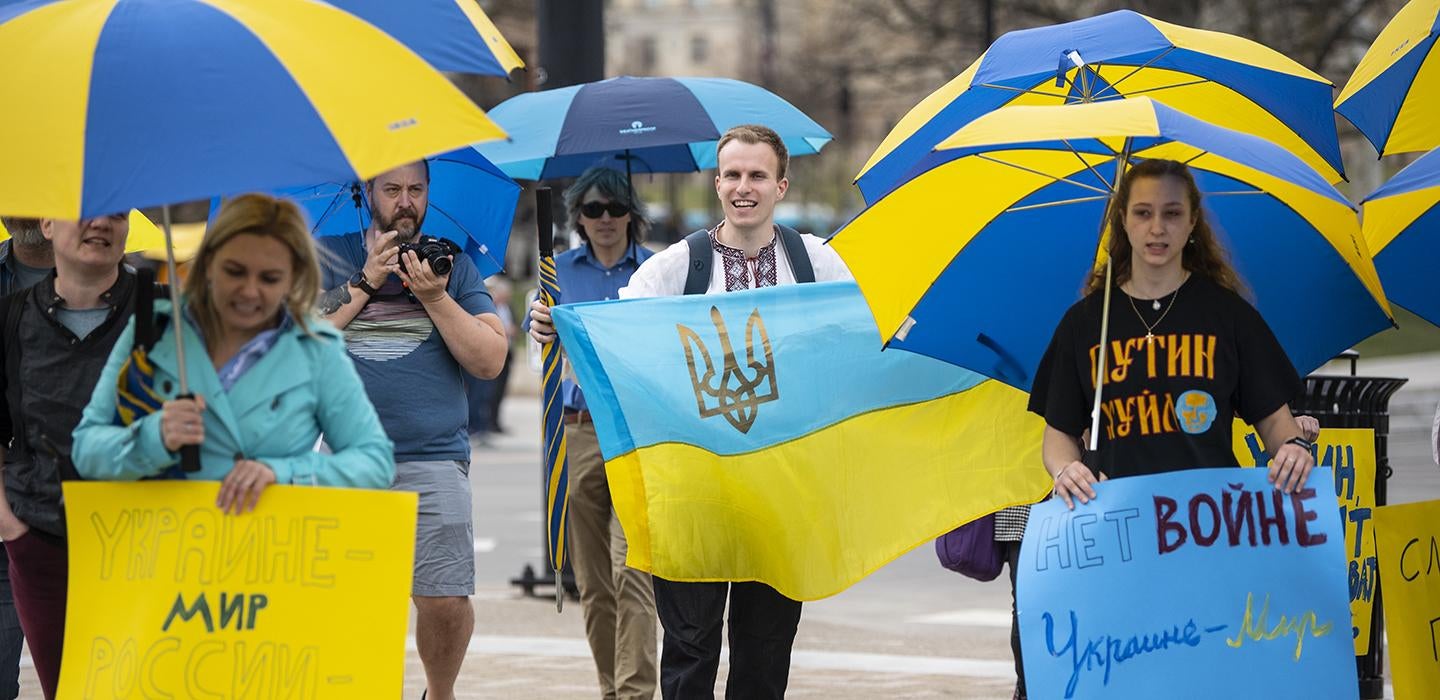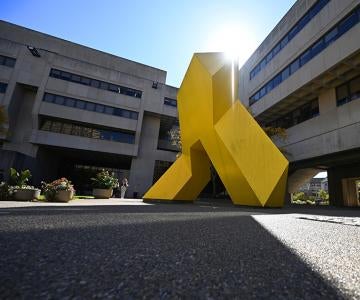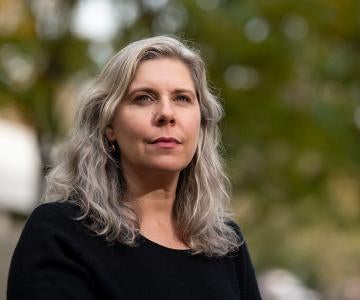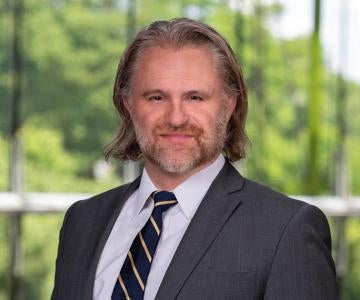
Subscribe to Pittwire Today
Get the most interesting and important stories from the University of Pittsburgh.Eleven students in the University of Pittsburgh’s Capstone Seminar in International Economics got an on-the-ground look at Russia’s invasion of Ukraine this term.
Instructors Svitlana Maksymenko and Tymofiy Mylovanov are both natives of the war-torn country. The latter was in Kyiv when Russia’s invasion began and, as president of the Kyiv School of Economics, opted to stay. Still, he continued virtually co-instructing his students, who, over the semester, used economic concepts and theories to analyze real-world issues and situations.
“Being able to hear and learn from Tymofiy has been both cool and devastating,” said Adrian Waplinger a junior studying economics and psychology. He recalled Mylovanov, who also served as Ukraine’s minister of economic development, trade and agriculture, and Maksymenko inviting high-ranking officials from national banks and governments to speak to the class.
“Hearing from Tymofiy and these experts in January and February was cool because we could get many different perspectives on some of the economic and political issues in Eastern Europe,” said Waplinger. When the conflict began, the students witnessed and received information in real time.
“I can’t even imagine how this war has impacted [both professors], but they continue teaching, helping us and answering any questions we have,” said Waplinger.
As the spring term progressed, the class more sporadically connected with Mylovanov, about once every two weeks. On April 7, he FaceTimed and carried them along the sidewalks of a western Ukrainian city where street musicians played, a fully operational ATM was in view and patrons visited a stocked grocery store.
“Life goes on,” commented Maksymenko after the call.
“I remember he video-called our class and showed us life continuing, and I felt so emotional seeing people try to go about ordinary life in a city with air raid sirens blasting daily,” said Michelle Furmansky a junior economics, politics and philosophy major in the Kenneth P. Dietrich School of Arts and Sciences. Though she calls Dresher, Pennsylvania, home, the economics course unlocked something personal for the Ukrainian-American whose parents and brother immigrated from Kyiv as refugees from the Soviet Union.
“Beyond the fact that I am deeply interested in international economic policy, especially labor and economic development, my ties to Ukraine made the course incredibly appealing,” said Furmansky.
She began the semester already knowing Mylovanov and Maksymenko and was thrilled the course would center around Ukraine and the country’s economic progress in a modern context.
“It has been both heartbreaking and enlightening,” she said. “I have been offered a unique, personal glimpse into the war and what life is like for ordinary people. Moreover, I have been given opportunities to help the Ukrainian people in unique ways through my classwork by writing briefs identifying new companies and industries for the Ukrainian government to suggest as future recipients of sanctions and devising new strategies for NGOs to help with the refugee crisis.”
Furmanksy and Waplinger were in the same group for their final project, which initially focused on youth unemployment in Portugal following the pandemic. However, conversations with Mylovanov about the war, Furmansky said, influenced their approach to their project. They switched course to address how accepting Ukrainian refugees into Portugal would affect youth unemployment and the general economy, and uncovered positive findings.
Runjie Wang is a senior mathematics and economics major whose project was directly influenced by the war in Ukraine.
“I was totally shocked by the war, since we’d been discussing that there shouldn’t be one just a few days before,” said Wang. “It, indeed, makes me think about how people and government should respond to an unexpected situation.” It also helped her group decide to focus their final presentation on how sanctions on Russia influenced the economy. “These conversations brought me a different perspective compared to those I got on the internet and made me think about what’s crucial for the economies of certain countries.”
Each student said they’ve changed because of the course.
“This class has changed my outlook and what I am thinking about beyond graduation,” said Waplinger, who until recently was unsure of what he wanted to do. “After taking this class and interacting with Tymofiy, I see how economics can be used to help a country and people. This class has made me consider a future working for some international, nongovernmental organization or a nonprofit where I would be able to use what I’ve learned at Pitt to help others, similar to what Tymofiy is doing in Ukraine.”
Furmansky said that learning from Mylovanov and Maksymenko “made the work we were researching feel more real and vital to the world’s future.”
- The Kyiv School of Economics humanitarian aid campaign
- Nova Ukraine
- The Ukrainian Red Cross Society
- Razom for Ukraine
- United Help Ukraine
- Voices of Children Foundation
- Save Life of Ukraine
- UNICEF
— Kara Henderson, photo of an Oakland rally for Ukraine by Aimee Obidzinski





